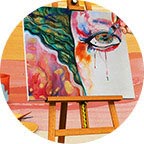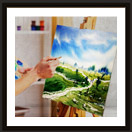
The art world can look a bit intimidating at first. The understanding of this subject comes with the flow of time and in the beginning it is quite common to find oneself lost in the various genres of art which are extensively available. It is typical to get confused and feel lost in the pensiveness of the art world. However, you must remember that everyone, at some point of time or the other, kept their first step into this domain. The experts of today were amateurs of yesterday. So if you have been thinking for some time about creating a beautiful art collection which you could address as your own, then it is time to start preparing for it. This blog brings to you the most convenient and practical tips about that will help you in placing your first step in the art world firmly.
- Understand your taste:
The first and the most important thing to do are to find out the art type which is of your liking. You must understand that art is an extremely subjective field. What you find appealing might not be liked by someone else, and that is completely ok! Digging deep within and sensing your penchant is paramount in the process of collecting art. Familiarisation with your liking will help you in paving the way through the art world while channelizing your efforts only in the direction which is of your liking. Doing this is vital as it keeps the various ambiguities at bay. You decide the genre of art which is in sync with your taste and then you explore it further. The best way to do is through studying. Research is your best friend which will empower you in gaining detailed knowledge in the field of art. - Start small:
Experts generally don’t suggest going for the large pieces at first. It is always a good idea to start small. In the initial stages you can opt for canvas prints which are an affordable alternative to the massive elaborate paintings. Doing so would give you a fair idea of what art is and purchasing canvas prints in the genre of your choice will help in further assessment. Prints don’t demand a high level of investment and after you purchase them, you can go about exploring into your desired field even more. Starting small and then moving your way up is a safe and systematic approach for new beginners in the world of art. - Define your budget clearly:
Art pieces are extremely enticing and it is easy to lose sight of one’s budget after seeing an extremely captivating artwork. While deciding your financial plan for purchasing a painting or canvas prints, it is vital that you decide to keep an extra amount of money over and above your budget. This extra money comes in really handy while purchasing artworks as they come with various kinds of additional hidden costs like shipping, insurance, framing etc. A clear picture of your budget helps you in narrowing down your search. However, the other side to the story is that people often end up regretting the paintings that they didn’t buy. Based on your budget and how much you can extend it you can decide whether or not you are willing to go for the bigger fish in the pond. Most certainly, setting up a budget is really helpful. - Buy what you love:
There is no better tip than this when it comes to art. You should only buy those pieces which suit your liking. Listening to other’s opinions and abiding by them are two different things. When it comes to purchasing the painting or canvas prints that you have been eyeing on, then you need to go and buy them. Trusting your instinct and being confident about your purchase is vital here. It is your artwork and you will be seeing it every single day that is why it is important for you to love it thoroughly.
Indeed, the art world is extremely beautiful. You will be able to admire its exquisiteness only after stepping into it. It might look frightening from the outside but once you choose to be a part of it, there is nothing which can even come close in comparison to it. Right from adorning your home to acting as a smart investment piece, paintings, canvas prints and other artworks never forget to charm and benefit its owners.





















